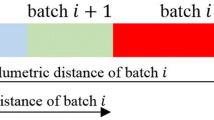Abstract
The pooling problem is an important industrial problem in the class of network flow problems for allocating gas flow in pipeline transportation networks. For the pooling problem with time discretization, we propose second order cone programming (SOCP) and linear programming (LP) relaxations and prove that they obtain the same optimal value as the semidefinite programming relaxation. Moreover, a rescheduling method is proposed to efficiently refine the solution obtained by the SOCP or LP relaxation. The efficiency of the SOCP and the LP relaxation and the proposed rescheduling method is illustrated with numerical results on the test instances from the work of Nishi in 2010, some large instances and Foulds 3, 4 and 5 test problems.






Similar content being viewed by others
References
Ahmadi, A.A., Dashb, S., Hal, G.: Optimization over structured subsets of positive semidefinite matrices via column generation. Discrete Optim. 24, 129–151 (2017)
Ahmadi, A.A. Majumbar, A.: DSOS and SDSOS optimization: Lp and socp-based alternatives to sum of squares optimization. In: Proceedings of the 48th Annual Conference on Information Sciences and Systems, pp. 1–5 (2014)
Ahmadi, A.A., Majumdar, A.: Spotless: software for DSOS and SDSOS optimization (2014). https://github.com/spot-toolbox/spotless
Alfaki, M.: Models and Solution Methods for the Pooling Problem. Ph.D. thesis, University of Bergen, Department of Informatics, University of Bergen (2012)
Alfaki, M., Haugland, D.: Strong formulations for the pooling problem. J. Glob. Optim. 56, 897–916 (2013)
Barker, G.P., Carlson, D.: Cones of diagonally dominant matrices. Pac. J. Math. 57(1), 15–32 (1975)
Ben-Tal, A., Eiger, G., Gershovitz, V.: Global minimization by reducing the duality gap. Math. Program. 63(1–3), 193–212 (1994)
Drud, A.: CONOPT—A large scale GRG code. ORSA J. Comput. 6, 207–216 (1994)
Gounaris, C.E., Misener, R., Floudas, C.A.: Computational comparison of piecewise-linear relaxations for pooling problems. Ind. Eng. Chem. Res. 48(12), 5742–5766 (2009)
Gupte, A., Ahmed, S., Dey, S.S., Cheon, M.S.: Relaxations and discretizations for the pooling problem. J. Glob. Optim. 67(3), 631–669 (2017)
Haverly, C.A.: Studies of the behavior of recursion for the pooling problem. ACM SIGMAP Bull. 25, 19–28 (1978)
IBM. IBM ILOG CPLEX user’s manual. Tech. Rep. (2015)
Kim, S., Kojima, M.: Second order cone programming relaxation of nonconvex quadratic optimization problems. Optim. Methods Softw. 15(3–4), 201–224 (2001)
Kim, S., Kojima, M.: Exact solutions of some nonconvex quadratic optimization problems via SDP and SOCP relaxations. Comput. Optim. Appl. 26, 143–154 (2003)
Kolodziej, S.P., Grossmann, I.E., Furman, K.C., Sawaya, N.W.: A discretization-based approach for the optimization of the multiperiod blend scheduling problem. Comput. Chem. Eng. 53, 122–142 (2013)
Liberti, L., Pantelides, C.C.: An exact reformulation algorithm for large nonconvex NLPs involving bilinear terms. J. Glob. Optim. 36(2), 161–189 (2006)
Marandi, A., Dahlc, J., de Klerk, E.: A numerical evaluation of the bounded degree sum-of-squares hierarchy of Lasserre, Toh, and Yang on the pooling problem. Ann. Oper. Res. 265(1), 67–92 (2018)
Marandi, A., de Klerk, E., Dahlc, J.: Solving sparse polynomial optimization problems with chordal structure using the sparse, bounded-degree sum-of-squares hierarchy. Discrete Appl. Math. (to appear) (2018)
MOSEK ApS. Moset optimization toolbox for MATLAB (2019). https://docs.mosek.com/9.0/toolbox.pdf
Nishi, T.: A semidefinite programming relaxation approach for the pooling problem a semidefinite programming relaxation approach for the pooling problem. Master’s thesis, Kyoto University, Department of Applied Mathematics and Physics, Kyoto University (2010)
Ralph, D.: Nonlinear programming advances in mathematical programming with complementarity constraints. R. Soc. (2007)
Ralph, D., Wright, S.J.: Some properties of regularization and penalization schemes for mpecs. Optim. Methods Softw. 19(5), 527–556 (2004)
Sturm, J.F.: SeDuMi 1.02, a MATLAB toolbox for optimization over symmetric cones. Optim. Methods Softw. 11&12, 625–653 (1999)
Tütüncü, R.H., Toh, K.C., Todd, M.J.: Solving semidefinite-quadratic-linear programs using SDPT3. Math. Program. 95, 189–217 (2003)
Todd, M.J.: Semidefinite optimization. Acta Numer. 10, 515–560 (2001)
Waki, H., Kim, S., Kojima, M., Muramatsu, M., Sugimoto, H.: Algorithm 883: SparsePOP: a sparse semidefinite programming relaxation of polynomial optimization problems. ACM Trans. Math. Softw. 35(2), 15 (2008)
Yamashita, M., Fujisawa, K., Fukuda, M., Kobayashi, K., Nakata, K., Nakata, M.: Latest developments in the SDPA family for solving large-scale SDPs. In: Handbook on Semidefinite, Conic and Polynomial Optimization, pp. 687–713. Springer, New York (2012)
Yamashita, M., Fujisawa, K., Kojima, M.: Implementation and evaluation of SDPA 6.0 (semidefinite programming algorithm 6.0). Optim. Methods Softw. 18(4), 491–505 (2003)
Zanni, E.: Can Semidefinite Programming be a Key Approach to the Pooling Problem?. University of Edinburgh, Edinburgh (2013)
Author information
Authors and Affiliations
Corresponding author
Additional information
Publisher's Note
Springer Nature remains neutral with regard to jurisdictional claims in published maps and institutional affiliations.
S. Kim: The research was supported by NRF 2017-R1A2B2005119. M. Yamashita: This research was partially supported by JSPS KAKENHI (Grant Number: 15K00032, 18K11176).
Rights and permissions
About this article
Cite this article
Kimizuka, M., Kim, S. & Yamashita, M. Solving pooling problems with time discretization by LP and SOCP relaxations and rescheduling methods. J Glob Optim 75, 631–654 (2019). https://doi.org/10.1007/s10898-019-00795-w
Received:
Accepted:
Published:
Issue Date:
DOI: https://doi.org/10.1007/s10898-019-00795-w
Keywords
- Pooling problem
- Semidefinite relaxation
- Second order cone relaxation
- Linear programming relaxation
- Rescheduling method
- Computational efficiency




